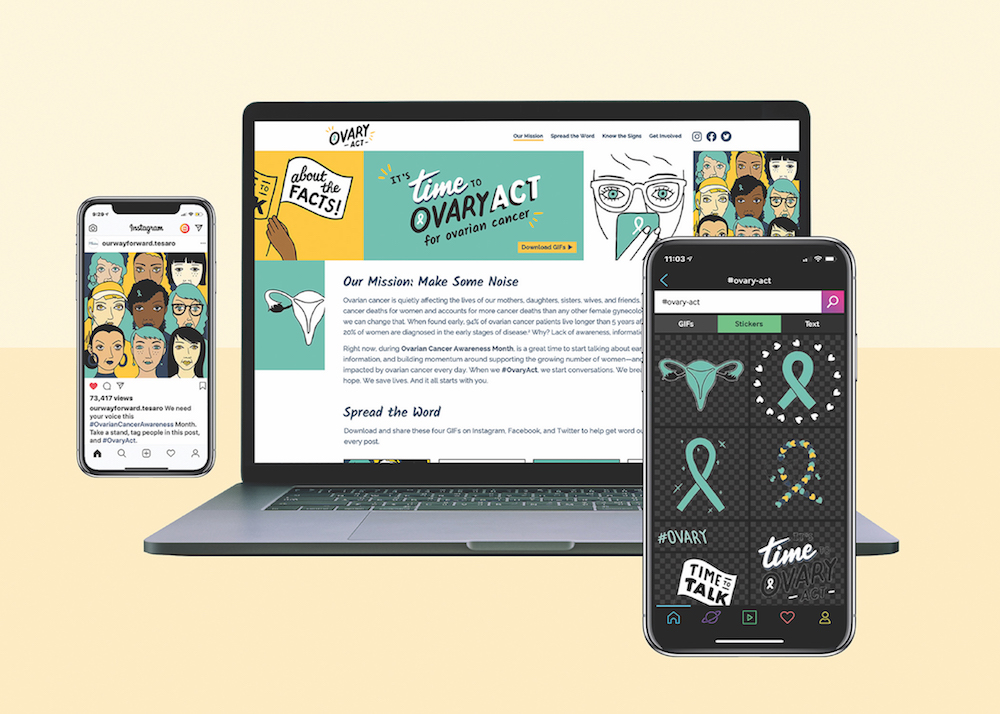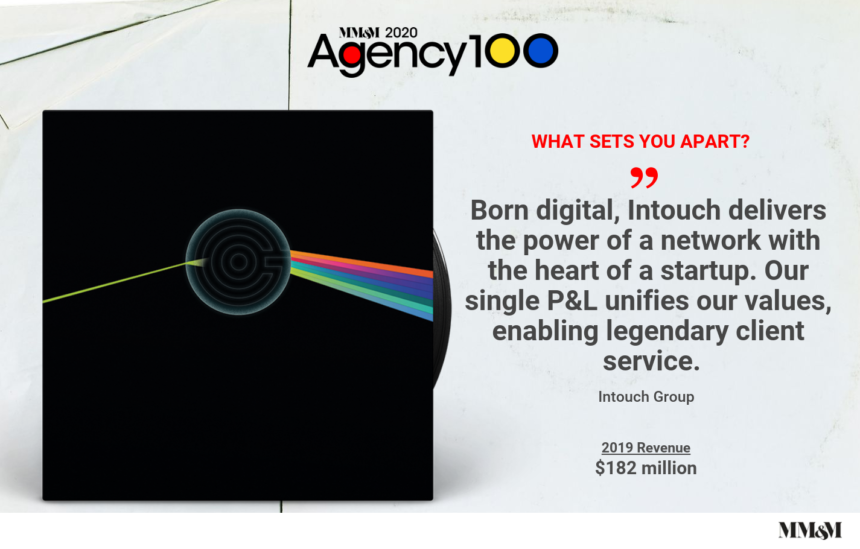Intouch Group celebrated its 20th birthday in style last September, gathering almost 1,000 employees in downtown Kansas City, Missouri. Dubbed “(re)GROUP,” the celebration/reunion included outdoor games, a big Make-A-Wish reveal (in which Darth Vader and lightsabers played a role) and a concert by ’90s mainstay Third Eye Blind.
“It was a big rah-rah moment for the agency,” recalls EVP of marketing and communications Wendy Blackburn. She notes that the celebration doubled as a rebirth of sorts, with Intouch debuting its new mantra: “No challenge too big to cure.”
“After 20 years, it felt like a good time to refresh our values and make sure we were in line with where we wanted to be,” she adds.
That’s very much in line with what Blackburn calls Intouch’s “scrappy startup mentality,” which exists even as the agency continues to ascend the revenue rankings. “We can innovate and we can chart our own course — part of that’s being independent — and we’re committed to solving our clients’ challenges in whatever way we can. It’s not taking no for an answer,” she explains.

Last year saw Intouch grow its revenue by 30%, to $182 million from $140 in 2018. Over the course of the year, the company opened two California offices (in San Francisco and San Diego) and launched a new, full-service affiliate, Intouch Seven. Intouch Seven is, you guessed it, the group’s seventh agency brand, joining Intouch Solutions, Intouch Proto, Intouch International, Intouch Media, Intouch Enterprise and Intouch Analytics. The organization now counts offices in eight U.S. cities (with headquarters in Overland Park, a suburb of Kansas City), plus London and Mumbai.
Blackburn attributes the revenue surge to “a mix of current clients bringing us more business and our business development team bringing in new clients — a mix of small, medium and large. It’s not that we landed a couple of really big fish; it’s ‘all of the above.’” Intouch Group CEO and founder Faruk Capan adds that the organization “doesn’t lose many clients; we keep adding them. And we care about loyalty to our clients, which makes it easier to grow.” It’s worth noting that Intouch’s first two clients, Teva and Sanofi, remain on its roster 21 years later.
2019 additions included Athenex, Biogen, FORMA Therapeutics, Global Blood Therapeutics, Merz, Tricida and RegaloRx. The company launched more than 15 products and indications, including Alnylam Pharmaceuticals’ Givlaari, which treats a rare genetic disorder; GSK/Tesaro’s Zejula, for recurring ovarian, fallopian tube or primary peritoneal cancer; and Global Blood Therapeutics’ Oxbryta, for sickle cell disease. Intouch also snagged new assignments from existing clients Genentech and Regeneron.
Blackburn is especially proud of a campaign that made groundbreaking use of social media.
During Ovarian Cancer Awareness Month last September, Tesaro (now part of GlaxoSmithKline) and Intouch Solutions launched #OvaryAct (pronounced “over-react”), which asked people to share impactful, even playful, GIFs. The idea was to bring a misunderstood, underfunded disease and its symptoms into the public eye. It marked the first time a pharmaceutical company had engaged in a promotional media partnership with GIPHY — and, in a single month, it garnered more than two million engagements on social media and 12.5 million impressions.

While Intouch jumped its staff size from 842 in 2018 to 982 at the end of 2019, there weren’t a lot of executive hires. That said, the company imported Mark Arnold from FCB Health network shop Neon to serve as SVP, managing director of client services at Intouch Proto. “As we build out our affiliate agencies we need strong leaders at the helm,” Blackburn says. Kim Bishop, who joined Intouch as an account manager in 2003, was promoted to SVP, managing director of client services at Intouch Seven.
Blackburn acknowledges that fast growth can affect a company’s culture. “When you add almost 150 employees in a year, you realize how new your workforce really is,” she explains, adding that Intouch wasted no time in addressing such concerns. “We work hard to make sure the new people understand who Intouch is and how we treat each other and our clients, and to keep our existing talent ingrained in the culture.” To that end, Intouch was named one of MM&M’s 2019 Best Places to Work last December. The judging panel cited the firm’s “top scores in workplace considerations and diversity and inclusion” and “highly rated management teams.”
Increasing diversity remains an important goal at Intouch, with Blackburn pointing to the company’s two-year-old Inclusion and Diversity Alliance as an essential part of such efforts. “We increased our under-represented minority employees in terms of race and ethnicity by 15% and we also increased the number of employees who disclose a disability. We had a big panel on disabilities — both hidden and obvious — and a lot of people came forward to share,” Blackburn says.
We’re one of the few agencies that was born digital and we look at everything we do through the digital lens.
Wendy Blackburn
Intouch has also addressed issues around gender identity. “I’m not bold enough to claim we’re the first, but I haven’t seen anyone else in the industry add pronouns to email signatures. That really meant something to a lot of people,” Blackburn adds.
While Intouch had aimed to push revenue to $200 million by the end of 2020, that forecast is up in the air amid the coronavirus fallout. “We’ll have to see what this year holds,” Blackburn says, though she believes the company is well-situated to make any/all necessary adjustments. “We’re one of the few agencies that was born digital and we look at everything we do through the digital lens. Right now, that’s really helping our clients find digital solutions to make the connections they need to make — pivoting from, say, a medical conference or a face-to-face rep call.”
“We’re used to change and we’re ready to adapt,” Capan adds. “That’s something that makes us different. And we’re certainly in a different time now.”
The best marketing we saw in 2019…
The Rape Tax, from Area 23 and the National Organization for Victim Assistance, was powerful and garnered important results. The campaign aimed to expose the fact that most victims of sexual assault are forced to pay some $1,000 in hospital bills. I love work that can truly claim to make a difference in someone’s life. — Wendy Blackburn
From the June 01, 2020 Issue of MM+M - Medical Marketing and Media







